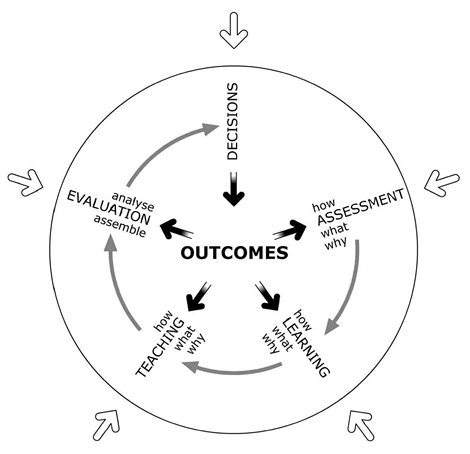Franconian International School
Humanities Department
Draft Materials: Do Not Quote
Return to: |
Franconian International School |
EdPsyc Interactive |
The humanities department at the Franconian International School has
undertaken a project to indentify and develop key competencies of the whole
student as means to focus its efforts on what it means to be competent in the
humanities. An organizing framework is the curriculum development process
described by Stephani (2004-2005). This framework has curriculum
developers first identify the desired outcomes and then describe how the
successful development of those competencies might be assessed. The next
step is to identify the learning processes students would use to develop those
desired outcomes and the pedagogical methods teachers would use to guide student
learning. Finally, instruments and methods would be developed to actually
evaluate student learning and prepare documentation that can be communicated to
interested stakeholders such as the learners themselves, teachers,
administrators, board members, etc.

Figure 1. A simplified version of Cowan &
Harding’s Logical Model of Curriculum Development (1986). The model places
learning outcomes at the centre and includes ‘why’ in addition to ‘what’ and
‘how’, relating to assessment, learning and teaching (Stefani, 2004-05).
Two primary sources were used to develop an initial set of desired outcomes:
the syllabi and documentation for the courses taught within the humanities
department and the learner profile developed by the International Baccalaureate
Organization (2009). Huitt's (2013) analysis of desired attributes listed
in a variety of frameworks showed the Learner Profile to be one of the most
complete overviews currently available. After much discussion the department constructed the
following statement regarding desired outcomes:
Humanities learners
will be knowledgeable thinkers who can gather and organize information and
communicate what they know.

Standards
Templates and Rubrics
A variety of theories were used to develop rubrics for each of these areas.
- Bloom et al.'s taxonomy of the cognitive domain
- Revised taxonomy
- Costa & Kallick's Habits of Mind
- Narvaez's components of moral thinking
- Partnership for 21st Century Skills
- Wiggins & McTighe's Understanding by Design
- Huitt's description of the domains of holistic development and materials
from the
Curriculum Mapping Project
- Reading Text
- A/V Media
- Listening
- Knowledgeable
- Thinkers
- Writing
- Media
- Speaking
Sample Lessons and Units
Presentation at ECIS Conference
Referenced Materials
- Anderson, L. W., & Krathwohl, D.(Eds.). (2001).
A taxonomy
for learning, teaching, and assessing: A revision of Bloom's taxonomy of
educational objectives. New York: Longman.
- Bloom, B.,Englehart, M., Furst, E., Hill, W., Krathwohl, D. (1956).
Taxonomy of
educational objectives: The classification of educational goals.
Handbook I: Cognitive domain. New York, Toronto: Longmans, Green.
- Costa, A. L., & Kallick,
B. (2000). Habits of mind: A developmental series. Alexandria, VA: Association for Supervision and Curriculum Development.
- Huitt, W. (2011, July).
A holistic view of education and
schooling: Guiding students to develop capacities, acquire virtues, and
provide service. Revision of paper presented at the 12th Annual International Conference
sponsored by the Athens Institute for Education and Research (ATINER),
May 24-27, Athens, Greece. Retrieved from
http://www.edpsycinteractive.org//papers/holistic-view-of-schooling-rev.pdf
- Huitt, W. (2013). Comparisons of attributes across frameworks of
possible curricula. Educational Psychology Interactive. Valdosta, GA:
Valdosta State University. Retrieved from
http://www.edpsycinteractive.org/brilstar/CurrMap/ltr/comparison-of-frameworks.xlsx
- International
Baccalaureate Organization. (2006). IB learner profile booklet. Cardiff,
Wales, UK: Author. Retrieved from
http://www.ibo.org/programmes/documents/learner_profile_en.pdf
- Narvaez,
D. (2006). Integrative ethical education. In M. Killen & J. Smetana
(Eds.),
Handbook of moral development
(pp. 703-733). Mahwah, NJ: Erlbaum. Retrieved
from
http://www.nd.edu/~dnarvaez/Narvaez HMD 09.14.pdf
-
Partnership
for 21st Century Skills. (2009).
P21 framework definitions.
Washington, DC: Author. Retrieved from
http://www.p21.org/documents/P21_Framework_Definitions.pdf
- Stefani, L. (2004-05). Assessment of student learning:
Promoting a scholarly approach. Learning
and Teaching in Higher Education, 1, 51-66. Retrieved from
http://www2.glos.ac.uk/offload/tli/lets/lathe/issue1/articles/stefani.pdf
- Wiggins, G., & McTighe, J. (2005).
Understanding by
design (Expanded 2nd ed.). Alexandria, VA: ASCD.


